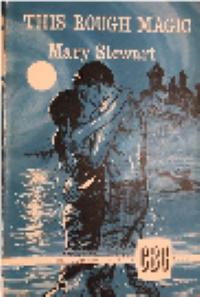
Book review by Sylvia D: I’m almost certain I read Mary Stewart novels when I was in my teens but cannot now remember any specific titles or plots. However, reading the reviews of her books that have already been posted, several themes seem to emerge: the combination of suspense and romance, a young, spirited female heroine, and the very strong sense of place – Hadrian Wall’s country in The Ivy Tree, Skye in Wildfire at Midnight, Provence in Madam Will You Talk?, the Greek Mainland in My Brother Michael and Corfu in This Rough Magic with its evocation of brilliant sunlight, the subtly different blues of the sky and the sea, the white sands, its highly scented, colourful flowers, its boisterous saint’s festival (St Spiridion) and its young Greek Adonises. This Rough Magic also has its fair share of literary quotations, particularly from Shakespeare’s The Tempest from which the title also comes.
This Rough Magic has all these. It has a thrilling plot interwoven with romance. Its heroine is the spirited Lucy Waring. Its sense of place emerges through Stewart’s vividly descriptive power.
The little town of Corfu was packed with a holiday crowd, and the air was loud with bells. Caught up in the river of people which flowed through the narrow streets, I wandered happily along under the sound of the bells, which competed with the subdued roar of voices and the occasional bursts of raucous brass from some upper window, where a village band was struggling with some last-minute practice. Shops were open, selling food and sweets and toys, their windows crammed with scarlet eggs ready for Easter, cockerels, dolls, baskets of tiny crystallized oranges, or enormous rabbits laden with Easter eggs. Someone tried to sell me a sponge the size of a football, and someone else to convince me that I must need a string of onions and a red plush donkey . . .
Lucy Waring, a young actress whose first major role in a West End play has ended after a run of only a few weeks, is staying with her pregnant sister, Phyllida, in her villa on a headland on the east coast of Corfu. It is known as the Villa Forli, the family name of Phyllida’s wealthy husband, Leo. Here’s Stewart’s description of the salon:
The saletto was a long, cool room, with three big windows opening on the terrace with its dazzling view. The sun was tempered by the wisteria that roofed the terrace, and the room was cool and airy, its duck-egg blue walls and white paint setting off to perfection the gilt of the Italian mirrors and the pale-gold polished wood of the floor. A calm room, with the kind of graceful simplicity that money and good taste can produce.
On a headland on the other side of their private bay the family own a second, similar villa, the Villa Rotha, which is let out to a highly respected photographer and writer, the tall, handsome Godfrey Manning. Higher up the cliff is a ramshackle Gothic castle, the Castello dei Fiori, which was built by Leo’s grandfather. The castle is let to the reclusive Sir Julian Gale, a Sir John Gielgud-style actor who had suddenly vanished from the London stage after his wife and daughter were killed in a car crash. What has happened to Sir Julian in the two years since the car crash is a mystery, but he rarely leaves the castle where he appears to be shielded by his son, Max, who is writing the music for a film of The Tempest.
On the first day of her holiday Lucy goes for a swim in a secluded bay where she is joined by a friendly dolphin. She suddenly realizes that what she thought were bees buzzing past her seawards are bullets from a silenced rifle. The thrilling plot develops rapidly from there and involves unexplained drownings, clandestine night-time boat trips, forgotten caves, packets of counterfeit Albanian currency – at its closest point Albania is only 3.6 kms from the Corsican coast and at the time was a closed, communist state – Cold War politics, the reappearance of the friendly dolphin at an opportune moment, a grim stand-off, ruthless hostage-taking, a heart-stopping fight with Sir Julian the hero of the hour, an exploding boat and a happy ending.
Now I have finished the book, I find there is another resonance, this time with Madam Will You Talk?, in his review of which George writes: ‘ The apparently trustworthy turn out to be villains and someone apparently sinister turns out to be a dependable British policeman.’ In This Rough Magic the apparently trustworthy turns out to be the villain and the initially someone sinister turns out to be Lucy’s eventual swain.
This is a novel you want to keep reading and without doubt the sort of book that is very welcome under the present horrible circumstances in our own world. However, it does require a major ability to suspend disbelief; some of the logistics are barely credible and Stewart’s sense of time is definitely suspect. However, there is a myth that Corfu is the island on which Shakespeare based Prospero’s island and Stewart finds very appropriate quotations from The Tempest to head each chapter while, of course, Prospero’s Island is full of magic.
Maybe I’ll try Gerald Durrell’s Prospero’s Cell now.
